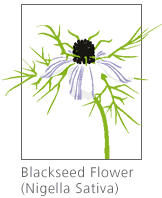 |
|||||||
 |
|||||||
|
Order
your Iman Virgin Black Seed Oil is amongst the purest and finest brand of Black Seed Oil you will come across. 100% Virgin Cold Pressed Extraction. Order Now. Order
your Iman Honey paste is the combination of pure Quality Honey with Iman Virgin Black seed oil. The combined effects of this product gives the product extra strength and has been used for centuries to promote inner strength. Order Now. |

![]()
![]()
The Black Seed is scientifically known as Nigella Sativa, the herd grows about 16-24 inches in height. From it comes a small rectangular Black Seed which is also known as the Blessed Seed (Arab: Habbat ul Baraka, or Habbat ul Sauda).
The ancient Egyptians knew and used the Black Seed and described it as a panacea (cure for problems/disease). The Romans also knew this seed and called it Greek Coriander. Documented by the Greek physician of the 1st century, Dioscoredes, as an ailment for general health problems such as toothaches, headaches and was mainly used as a dietary supplement.
Black Seed has a stabalising effect on the Human Immune System which combats diseases that are a product of defective immune systems. So if the immune system is maintained, then the over all effect on the rest of the body can be felt.
A prophetic Medicine as recommended 1400 years ago by the Prophet Muhammad (Peace Be Upon Him). In his divine wisdom he said - "Use the Black Seed for indeed, it is a cure for all diseases except death. Sahih Bukari 7:591
The Black Seed has been known and used throughout many cultures for over two thousand years.
The different names for Black Seed Oil Black Seed Oil is referred to differently depending on where in the world you are. Variations can be found regionally, for example between places in India it is referred to as Kalonji or Kalwanji Oil, whilst in Arabia it is commonly know as Habbat ul Sauda. Arabic Habbat ul Sauda, Habbat ul Baraka Dutch Nigelle, Narduszaad English Fennel flower, Onion seed French Cheveux de Vénus, Nigelle, Poivrette German Zwiebelsame, Nigella, Schwarzkümmel Hindi Kalounji, Munga reala Indonesian Jinten hitam Italian Nigella Malay Jintan hitam Punjabi Kalongi Russian Charnushka Singhalese Kaluduru Spanish Niguilla, Pasionara Tamil Karun jiragam Turkish Çörekotu siyah
![]()
History
of Blackseed | Diseases &
their Cures | Downloads
Design by MDUK
Media
![]()



